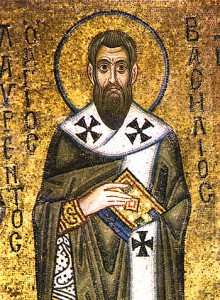 It is New Year’s Day. Most of us are celebrating with a quiet day off. But there are two holy days today that I’m guessing most of my readers are not giving too much attention to.
It is New Year’s Day. Most of us are celebrating with a quiet day off. But there are two holy days today that I’m guessing most of my readers are not giving too much attention to.
The first is “The Circumcision of Jesus.” It is the eighth day of Christmas, and the eighth day is when a Jewish boy would be …
Well, you know. Our Lord fully identified with the human experience.
The second is the feast day of St Basil of Caesarea (330-379), at least in Eastern Orthodoxy. He’s “St Basil the Great” to East and West — and for good reason.
St Basil the Great
Let’s take just one topic on which he was monumentally influential: the Holy Spirit. If you have a decent understanding of the Holy Spirit, you can thank St. Basil for it.
You may well take it for granted that the Holy Spirit is truly God, one of the three Persons of the Trinity. But it wasn’t always entirely clear in the Church’s teachings.
In retrospect the Scriptures may seem perfectly clear on the topic, but it is only in retrospect.
The Back Story
Here’s the deal: Early on Christians praised the God they found in the Bible and in their own living faith. They praised the Father, the Son, and the Holy Spirit, and they knew that there is only one God. But the details were a tad fuzzy.
Then came the 4th century, the period when Basil was born. Christianity was becoming legal and socially acceptable. It was no longer just for the marginalized. People like Basil who had the best education in the world were coming to salvation in Christ.
And they brought their skillful minds with them. They began thinking about the Bible and worship and theology in much more careful ways.
Big questions began to arise. Everything about the Trinity had to be thought through, and argued over, in detail.
First it was about the Son of God. Arianism said the Son was created by the Father. Just before Basil was born the Council of Nicaea said no, the Son is eternally the Son and the Father is eternally the Father; they are “of the same substance,” “true God from true God.”
The Holy Spirit
Then came the Holy Spirit. As soon as the deity of the Son was settled (sort of — the Arian party was in power off and on for a very long time) questions arose about whether the Holy Spirit was really God. Or really as much God as the Father and the Son.
It was St Basil the Great who wrote the first book-length discussion of the Holy Spirit.
First he used arguments much like those used earlier to defend the divinity of the Son.
Then he explored the whole range of biblical discussion on the Spirit.
And then he did a very clever thing: He pointed out that from the very earliest days, Christians have, in worship and prayer, praised the Spirit exactly as they praise the Father and the Son. To say the Spirit was not God like the Father and Son are God would be to say all of Christianity had always been wrong in the way they related to God.
Yes, tradition had a big voice in this — tradition that embodied Apostolic teaching and truly universal practice.
Worship, Community, Doctrine, Compassion
Besides basic doctrine, St. Basil was influential on other important fronts:
- He cared about worship, writing one of the primary liturgies still in use in the Orthodox tradition.
- He cared about community, organizing monastic life for both men and women, shaping it to the present day.
- He cared about the spiritual and theological health of the larger Church: as an Archbishop he put in place many Orthodox bishops, helping the Nicene party eventually win the day.
- And he was compassionate, working for the welfare of the poor.
How I wish we had more like St. Basil serving the Church today. May he be a role model for all of us who lead God’s people.

Leave a Reply